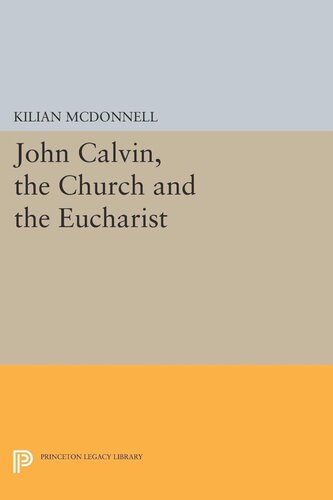

Most ebook files are in PDF format, so you can easily read them using various software such as Foxit Reader or directly on the Google Chrome browser.
Some ebook files are released by publishers in other formats such as .awz, .mobi, .epub, .fb2, etc. You may need to install specific software to read these formats on mobile/PC, such as Calibre.
Please read the tutorial at this link: https://ebookbell.com/faq
We offer FREE conversion to the popular formats you request; however, this may take some time. Therefore, right after payment, please email us, and we will try to provide the service as quickly as possible.
For some exceptional file formats or broken links (if any), please refrain from opening any disputes. Instead, email us first, and we will try to assist within a maximum of 6 hours.
EbookBell Team

0.0
0 reviewsCalvin's eucharistic doctrine has been approached in the past from the standpoint of his polemic with the Lutherans and the Zwinglians, but Father McDonnell believes that Calvin’s primary position was determined by his rejection of Roman Catholicism. The author, therefore, explores Calvin’s eucharistic doctrine through a comprehensive analysis of his stand against the Roman Catholic Church. Introductory chapters are devoted to the broader currents of pre-Reformation thought: Scotist tradition, devotiomoderna, humanism, and the Platonic renewal. The study continues with a discussion of St. Augustine, the medieval disputants, and the doctrines of Calvin’s contemporaries-Luther, Bucer, and Melanchthon. The final chapter considers the relevancy of Calvin’s objections to Catholic eucharistic doctrine and their relation to modern developments in Catholic sacramental thought.
Originally published in 1967.
The Princeton Legacy Library uses the latest print-on-demand technology to again make available previously out-of-print books from the distinguished backlist of Princeton University Press. These editions preserve the original texts of these important books while presenting them in durable paperback and hardcover editions. The goal of the Princeton Legacy Library is to vastly increase access to the rich scholarly heritage found in the thousands of books published by Princeton University Press since its founding in 1905.